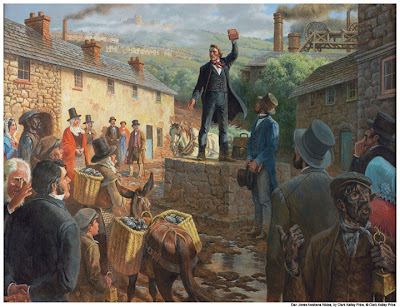When President Osguthorpe first arrived in the mission field, the South Dakota Rapid City Mission was baptizing, on average, something around 20 investigators a month. Overall, that represented around 1 or 2 converts per missionary, per year. President Osguthorpe is reported to have said, “We could do nothing, and still baptize as many people. Something is seriously wrong here.” As I’ve mentioned in a previous post, he concluded that what we lacked was faith. We didn’t believe we could bring more people to Christ. South Dakotans were just too hardened. They just didn’t care about what we had to offer. We didn’t believe the promise made in the scriptures that the field was white, and ready to harvest. We saw the field as dead and trampled, and believed it was time to move on.
At about the same time, I believe, President Hinckley challenged mission presidents to double of the number of converts coming into the church. President Osguthorpe took that challenge seriously. He taught. He instructed. He raised our visions. He showed us what could be. He sparked whatever faith was remaining and turned it into a flame. Miracles happened. I remember sitting in zone conference when President Osguthorpe played a recording of a phone call he had made earlier that week. It was a personal conversation between himself and President Hinckley (President Hinckley referred to him as “Russ”), in which he reported that the mission had more than accomplished its goal of doubling the number of converts. President Hinckley’s loving reply was, “That is excellent. Just excellent. Thank you. Now you hold on to them! Hold on to them. Let’s keep them.” During President Osguthorpe’s last month on the mission, I believe every missionary in the mission brought someone into the church. Continue reading


 My former mission president, Russell Osguthorpe, is presently the director of the Center for Teaching and Learning at BYU. Recently, he published a book called Choose to Learn. I stopped by his office a few months ago, and he gave me a copy of the book. I’ve been re-reading it, and the book is basically a transcript of our mission zone conferences. He ran the mission like he would a classroom, and I believe that he was a master at teaching. Anyways, the book reminded me of a diagram that President Osguthorpe showed us while we were missionaries:
My former mission president, Russell Osguthorpe, is presently the director of the Center for Teaching and Learning at BYU. Recently, he published a book called Choose to Learn. I stopped by his office a few months ago, and he gave me a copy of the book. I’ve been re-reading it, and the book is basically a transcript of our mission zone conferences. He ran the mission like he would a classroom, and I believe that he was a master at teaching. Anyways, the book reminded me of a diagram that President Osguthorpe showed us while we were missionaries: I judge movies not just by production quality, but moral quality as well. I ask myself, “Does this film or book make me want to be a better person?”
I judge movies not just by production quality, but moral quality as well. I ask myself, “Does this film or book make me want to be a better person?”  I meant to post this yesterday, but somehow it got lost in all my travels back to Utah from DC. Yesterday, August 6, was the anniversary of the bombing of Hiroshima. In that nuclear blast, over 60,000 non-combatant men, women, and children were killed.
I meant to post this yesterday, but somehow it got lost in all my travels back to Utah from DC. Yesterday, August 6, was the anniversary of the bombing of Hiroshima. In that nuclear blast, over 60,000 non-combatant men, women, and children were killed.